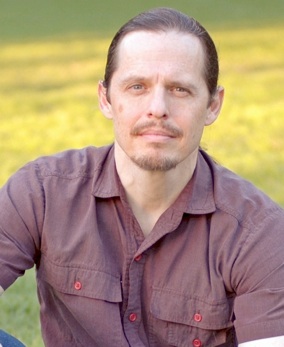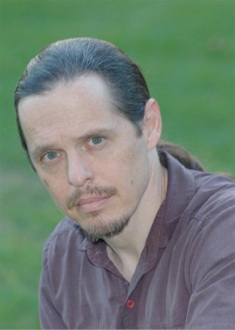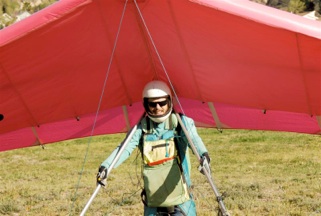KP: It came as a shock to realize that it has been almost seven years since we first did an interview! How the heck are ya? =)
Bjorck: I’m fine, thank you, Kathy! Yes, it’s hard to believe that you and I also first met almost seven years ago, shortly after September 11, when I came to your house for David Lanz’s first workshop. That weekend was a great time of “meetings,” as I also got to know Kevin Kern and several others. It is hard to believe that so many years have passed! Of course, it’s even harder to believe that we first met in correspondence back in 1997, when you reviewed my debut CD Pure Piano Portraits. Where has the time gone?
KP: It’s getting kind of scary! When we did the 2001 interview, you had two CDs released, and now you have four. The most recent one, “This I Know: Ageless Hymns of Faith,” was released the end of last year (2007). How did you choose the fifteen hymns that are on the CD, and how long did it take you to do the arrangements?
Bjorck: As the liner notes to this most recent CD say, I grew up singing all the great old hymns in church, complete with a stuffy old organ! Not only are they important to me because of my faith, but they constitute a large part of my nostalgic core self. As you know, my first three CDs begin and end with my arrangements of old hymns, so those six hymns were obvious choices for this project. The liner notes of my latest CD go quite into depth regarding the significance of each one, but suffice it to say, every one is a personal favorite!
As for the time it took me to compose my arrangements, it's hard to say. Some came quite quickly while others came in installments. This was due in part to the fact that I actually do not play the piano very much for a "pianist/composer"- probably five or ten minutes a day on average, with many days where I don't play at all. This is due to my very full life of many interests.
KP: It sounds like hymns have always been a big part of your life. Let’s talk about that.
Bjorck: Yes indeed! It saddens me that even the church tends to yield to the search for "newer, faster, better," and many churches don't use these hymns at all anymore. That is tragic, because frankly the lyrical quality and poetic depth of most classic hymns far outshine the typical praise song played by today’s worship bands. In addition, this music helps me feel more connected to my parents’ and grandparents’ generations. I often say that I am "generationally displaced." For example, I still call that big white thing in the kitchen that keeps your food cold an "icebox!"
KP: Don’t worry, I have a couple of friends who call it that, too! When did you first start playing the piano?
Bjorck: I started plunking out melodies at age four or five, and my mother began teaching me what she knew (not as a teacher but as someone who had taken lessons for a number of years) when I turned six. She stopped very quickly, however, because she feared that my learning fractions via quarter notes, eighth notes, and the like would result in my being bored in school. I was a very hyperactive child and needed quite a bit of stimulation to keep my attention! My mother resumed my lessons when I turned nine and gave me informal instruction until I was about thirteen. Unfortunately, neither she nor I realized that my memory was quite photographic, so I would memorize the music very quickly and then look down at my hands. As a result, I never learned to sight read. I could read music but it was painfully slow. When I retire, I plan to get a piano teacher who will promise to smack me on the knuckles with a stick if I look down while playing, and I hope to really learn piano right this time... from scratch! Maybe you could be my teacher... do you have a stick? :-)
KP: That can be arranged, but it will be kind of hard to reach you online! Maybe I can just cue you when it’s time to smack your knuckles and you can do it yourself! One of my former adult students had such a problem with watching his hands that he resorted to attaching a board to his piano above the keyboard so he literally COULDN’T see his hands! That’s extreme, but it worked! As a hyperactive child, was music a tool to help you calm down and focus?
Bjorck: Yes and no. I could certainly sit and play for hours during my teenage years, but I wasn't necessarily focusing. Rather, I was wandering from one compositional idea to the next, playing out my feelings and occasionally stumbling upon the composition. I do remember sitting at the piano often and wistfully daydreaming about the fact that probably no one would ever hear my music. It is admittedly self-indulgent but fun that I have at least one composition on each of my CDs that was composed during the 1970s. People got to hear them after all!
KP: You continue to be a man of many hats, and music is one of a variety of activities that you do part-time. What else occupies your time?
Bjorck: Many things! You may recall that as a small child, I told my parents - with some frustration - that my hobby was collecting hobbies. Currently, I participate twice weekly in a step aerobics class where my wife, Sharon, volunteers as the instructor. It's great fun, and we have actually done it together for seventeen years. I also continue do regular weightlifting and walking/jogging, because fitness is very important to me. One of my greatest loves continues to be hang gliding, which I do whenever my busy schedule and the weather cooperate. I also continue to enjoy photography on a sporadic basis, and while I love digital cameras, I also enjoy pulling out my uncle’s 1952 35mm Zeiss. I used it to shoot the images on my most recent CD. I also love graphic design, and my CDs and my website keep me busy in that department. Landscaping and gardening continue to be great loves, and I enjoy working in our yard as a weekend warrior. I could go on, but you get the picture! In addition to these hobbies, I spend a great deal of time with my work for Lifewater International and as an elder at my church.
KP: How many classes do you usually teach at Fuller Seminary’s Graduate School of Psychology? How long have you been teaching there?
Bjorck: It’s hard to believe that this is my eighteenth year teaching at Fuller. I continue to love my work there. I typically teach two classes in the fall, one in the winter, and one in the spring quarters. Teaching credit is also given for activities other than class time. I also regularly work with students on their clinical skills, discussing their cases. In addition, I receive teaching credit for my supervision of master’s and dissertations, which are based on empirical research that I conduct with my students.
KP: Do you still have your private clinical psychology practice as well? When did you earn your Ph.D.?
Bjorck: Yes, my practice is very small but has continued to be active all these years. I see a wide variety of persons with a wide variety of problems. It's very fulfilling work. As for my Ph.D., the ink was still drying on my diploma when I started working at Fuller in the fall of 1990. In fact, I completed my own dissertation on November 7, was married on November 10, and walked through the front doors of Fuller on November 29 that year.
KP: You have been doing a lot of work the past several years with Lifewater International. Let’s talk about that.
Bjorck: How much time do you have! I could talk about Lifewater all day. Sharon and I have supported Lifewater since the late 1990s. I’ve served on the board since 2001, and this work is my passion. Most people in the USA don't realize that 1.1 billion people in the world lack access to safe water. Instead, women or girls typically walk three or four miles each way to get buckets of disease-filled water. That means that girls get pulled from school as soon as they are old enough to carry a bucket. Hundreds of thousands of cases of blindness each year would be totally preventable with proper hygiene, but you need to safe water for that. Even more startling is the fact that 2.6 billion people -- that's more than one out of 3 -- lack adequate sanitation facilities. We have toilets and they don’t even have a pit latrine. More children die each day in Africa due to waterborne disease than AIDS. In response to these problems, Lifewater works to empower local partners so that they may provide their own communities with safe water, sanitation, and hygiene. Lifewater provides a hand-up, not merely a hand-out. My service to Lifewater helps me to put my faith in action. Part of my work is educating people in this country, helping them understand that billions of people would gasp and possibly weep if they knew that safe drinking water is used in the USA to flush toilets and make lawns grow in the desert. The great news is that solution are inexpensive and very much can be accomplished with very little. I better stop or I’ll go on and on. Thanks for letting me share this, Kathy!
KP: How often do you perform your music?
Bjorck: My performances are extremely rare, and they typically consist of only one or two pieces. I just don't have the time to keep my repertoire up to snuff, and it's all in my head. I do have some great sheet music, thanks to the transcription genius of Michael Dulin and the proofreading genius of Kathy Parsons, but I can't even read my own music well. If I were performing, I would want to be playing at least an hour or two a day, and that is a luxury I cannot afford. As you can guess, this makes me all the more grateful that I am able to record music. Before doing an album, I will play an hour or two each day for about a month, but most of my compositions have at least two or three edits for the final production. ProTools can make anyone sound like a competent performer! :-)
KP: Do you plan to have sheet music of any of your hymn arrangements?
Bjorck: I already do. Currently, sheet music is available for four of my hymns. They can be purchased online as PDF files at PurePiano.com. A few other selections are also available, and I hope to have more in time.
KP: Your wife, Sharon, is also a professor. What is her field? How did you meet?
Bjorck: I met Sharon the first week that I began my doctoral studies at the University of Delaware in 1984. I went to an Inter-Varsity Christian Fellowship meeting, and she was the greeter at the door. That is one meeting I am very glad that I attended! For the past twenty-four years, she has continued to be my best and most faithful friend. Sharon is a professor at a large community college, where she has taught English in the American Languages division since 1995. This involves teaching English as a second language for academic purposes, such as writing college papers or giving college speeches.
KP: What have been some of the musical highlights of your life?
Bjorck: In the eighth grade, I received a standing ovation after my first solo composition performance. If that were not enough, after the concert my music teacher introduced me to his professor friend from Juilliard. This man said, "Keep it up and I want to see you in a few years." I chose not to pursue music full-time, which was not an easy choice. As a result, I don't believe my technical skills have actually improved much since the eighth grade! While I do not regret my choice to pursue other things and I feel richly blessed in the path my life has taken, I have often wondered if I actually might have been successful pursuing piano like that. Another musical highlight was my first professional recording, part of a music library, which was actually released before my first retail CD. My father-in-law had helped to finance my recording efforts, and I was able to present him with the first CD-R of that music before he died in 1996. That was very meaningful to me. Among other highlights, I suppose some of the most meaningful involve stories from people who have been deeply touched by my music. Hearing that a child with cancer has been able to relax during chemotherapy or that a person with chronic insomnia was able to sleep are examples of such encouraging stories.
KP: Since music isn’t a full-time endeavor for you, what do you find leads you to compose and/or play the piano?
Bjorck: The thing that prompts me to sit at the piano in the midst of my active life has remained constant since my teenage years. First and foremost, I am moved to play as a means of expressing emotion. Letting my feelings flow through my fingers and out onto the keys continues to be a great catharsis for me. By keeping a digital recorder handy, I am able to capture bits and pieces of music that take me by surprise and eventually become interwoven into full compositions.
KP: Where did your Pure Piano slogan of “quiet music to calm the heart in a noisy world” come from?
Bjorck: I honestly don't remember! I know I made it up, and I know I didn't see anything like it anywhere else at the time. As I recall, I simply tried to come up with a phrase that best described the function and purpose of my recorded music. I say "recorded" because I love playing other styles of piano as well, from jazz to blues to rock.
KP: Those are all of my questions unless you have anything else you’d like to talk about.
Bjorck: Thank you, Kathy! As always, it's a pleasure speaking with you, and I appreciate the great questions you ask! I will really look forward to our next interview, but let's not wait seven years. Life is too short! :-)
KP: Agreed!
Kathy Parsons
July 2008



